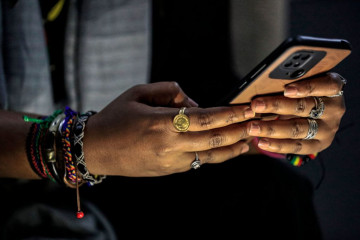

Safaa Bashir braced for the worst when she didn't hear from her father in Sudan for two months.
While Safaa resides in Canada, attending medical school, her parents and siblings evacuated from Sudan to Egypt a few months into the war.
Her father returned to his home state of Al Gezira in October 2023 to care for his ailing mother, unable to leave due to health conditions.
During this period, Safaa described connectivity in Al Gezira as completely ceased for two months.
"It was a nightmare. For two months, we had no idea if my dad was alive or dead," Safaa recounted with deep distress.
Months later, Safaa finally received a voice note from her father, reassuring them of his safety. This message brought her some solace amid the ongoing displacement her family faced.
Her father informed them he could only send voice notes when he relocated to neighbouring cities outside Al Gezira with better connectivity.
"We relied on a two-week cycle of voice notes, as many people from different villages gathered to do the same with their families abroad," she explained.
As phone calls became increasingly difficult for Safaa's family, voice notes became their primary method of communication.
Voice notes have become a crucial lifeline for Sudanese families like Safaa's.
As Nisrin Elamin, Assistant Professor at the University of Toronto, puts it, "Sudanese have become experts at the WhatsApp voice note; entire books, diaries, and confessions are being created via voice notes. There is a kind of permanence to them."
Evacuation efforts
This has also translated into evacuation planning efforts between the Sudanese diaspora and their families.
Murtada El Fadl, a Sudanese writer living in New York City, has relied on voice notes to coordinate his family's evacuation from Sudan in April 2023.
He and his close family members living abroad mobilised their networks internationally to strategically and safely guide family members in Sudan to Egypt.
Amid connectivity issues across Sudan and fears of cell phone confiscation at RSF-led checkpoints, Murtada's family abroad intricately planned every detail of the evacuation with the help of voice notes.
Before the Sudan war, Murtada never liked to use voice notes. However, during the war, voice notes were one of the only ways he could coordinate transportation on the ground for his family leaving Sudan.
"WhatsApp voice notes became very integral for coordinating all these networks," Murtada explained.
This meant that Murtada and his family had to contact people directly to coordinate buses and pick-up locations, using pinned Google Maps links to share their whereabouts and the pick-up points. Thanks to these efforts, they were safely evacuated to Egypt a few weeks later, in May 2023.
Reflecting on his family's harrowing journey a year later, Murtada explains that his role in documenting this war stems from his perspective as an indirect observer, experiencing the events through his family's accounts.
“As a journalist and a film curator, I have public forums where I'm in control, where I can say things that I want. That’s where I talk about Sudan and Sudanese culture,” he says.
"I think what I can control is through my network to inform the world about Sudan and what's happening there," Murtada adds.
Mutual support
Voice notes have also served as a means of strengthening intimate bonds between diasporas and locals in Sudan during the war.
Iman Abarro, a Sudanese creative living in Toronto, Canada, uses voice notes to connect with her grandmother in Sudan. While most of her family had evacuated early in the war, her grandmother fled in December 2023.
Although Iman couldn't speak directly on the phone, she periodically sent voice notes to check on her grandmother.
Even when she didn't always receive a response, her father, who could call directly from the region, reassured her that her grandmother appreciated hearing her voice.
"We would just talk about very trivial things," Iman recounts. "If I cooked a Sudanese dish, I would tell her about it and that I was thinking of her, and she would reply asking me about how I made it," she adds.
Voice notes exchanged between them created room for normalcy and familial care.
In our interview, Iman searched through her chats with her grandmother. She discovered they had been deleted as a security measure during border crossings.
This highlights the erasure of personal archives due to war precautions and underscores the dual role voice notes play as both a means of communication and potential historical evidence.
Still, for Iman, the archival process does not start with the war but with Sudanese culture at large. "It's about showcasing our culture, humanising us, and showing who we are,” she says.
“When considering the underreporting of Sudan, aside from our turmoil, people don't really know about Sudan and our culture and history."
Safaa described similar sentiments on how voice notes have allowed her to communicate with all her family members in times of joy despite connectivity challenges in Sudan.
"I used voice notes to celebrate birthdays, sending wishes and updates to my aunts and grandmother," Safaa recalled. "This kept me reassured and involved in their lives."
The Sudanese diaspora faces the challenging task of raising awareness and educating communities abroad about the urgency of the war in Sudan and its impact on Sudanese culture.
Archiving these experiences becomes increasingly complex, and voice notes have provided an avenue for Sudanese stories and narratives to be shared with the world.
Janine AlHadidi is a freelance Jordanian journalist living in Ottawa, Canada. Her work focuses on Arab film, gender, and art




 Follow the Middle East's top stories in English at The New Arab on Google News
Follow the Middle East's top stories in English at The New Arab on Google News


